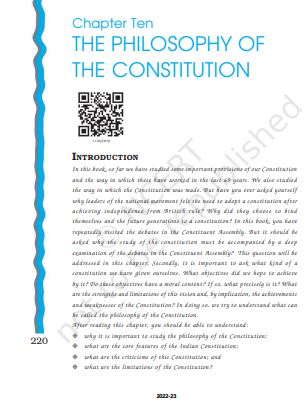‘NCERT Solutions for Class 11 Political Science Chapter 10 The Philosophy Of The Constitution‘ PDF Quick download link is given at the bottom of this article. You can see the PDF demo, size of the PDF, page numbers, and direct download Free PDF of ‘Ncert Class 11 Political Science Chapter 10 Exercise Solution’ using the download button.
The Philosophy Of The Constitution NCERT Textbook With Solutions Book PDF Free Download

Chapter 10: The Philosophy Of The Constitution
Some people believe that a constitution merely consists of laws and that laws are one thing, values and morality, quite another. Therefore, we can have only a legalistic, not a political philosophy approach to the Constitution.
It is true that all laws do not have a moral content, but many laws are closely connected to our deeply held values. For example, a law might prohibit discrimination of persons on grounds of language or religion.
Such a law is connected to the idea of equality. Such a law exists because we value equality.
Therefore, there is a connection between laws and moral values. We must therefore, look upon the constitution as a document that is based on a certain moral vision.
We need to adopt a political philosophy approach to the constitution. What do we mean by a political philosophy approach to the constitution? We have three things in mind. First, we need to understand the conceptual structure of the constitution.
What does this mean? It means that we must ask questions like what are the possible
meanings of terms used in the constitution such as ‘rights’, ‘citizenship’, ‘minority’ or democracy’?
Furthermore, we must attempt to work out a coherent vision of society and polity conditional upon an interpretation of the key concepts of the constitution. We must have a better grasp of the set of ideals embedded in the constitution.
Our final point is that the Indian Constitution must be read in conjunction with the Constituent Assembly Debates in order to refine and raise to a higher theoretical plane, the justification of values embedded in the Constitution.
A philosophical treatment of a value is incomplete if a detailed justification for it is not provided.
A political philosophy approach to the constitution is needed not only to find out the moral content expressed in it and to evaluate its claims but possibly to use it to arbitrate between varying interpretations of the many core values in our polity.
It is obvious that many of its ideals are challenged, discussed, debated, and contested in different political arenas, in the legislatures, in party forums, in the press, in schools, and in universities.
| Author | NCERT |
| Language | English |
| No. of Pages | 23 |
| PDF Size | 2.2 MB |
| Category | Political Science |
| Source/Credits | ncert.nic.in |
NCERT Solutions Class 11 Political Science Chapter 10 The Philosophy Of The Constitution
Question 1.
The following are certain laws. Are they connected with any value? If yes, then what is the underlying value? Give reasons.
(a) Both daughters and sons will have a share in the family property.
(b) There will be different slabs of sales tax on different consumer items.
(c) Religious instructions will not be given in any government school.
(d) There shall be no begar or forced labor.
Answer:
(a) It is connected with the value of ‘social justice under the right to equality, no one can be discriminated against on the ground of color, race, religion or sex, etc.
(b) It is based on the principle of the utility of different items only, it comes under economic justice.
(c) It is concerned with secularism.
(d) It also refers to social justice, not to be discriminated against on any grounds except capability.
Question 2.
Which of the options given below cannot be used to complete the following statement? Democratic countries need a constitution to:
(i) Check the power of the government.
(ii) Protect minorities from the majority.
(iii) Bring independence from colonial rule.
(iv) Ensure that a long-term vision is not lost by momentary passions.
(v) Bring social change in a peaceful manner.
Answer:
(iii) Bring independence from colonial rule.
Question 3.
The following are different positions about reading and understanding Constituent Assembly debates.
(i) Which of these statements argues that Constituent Assembly debates are relevant even today? Which statement says that they are not relevant?
(ii) With which of these positions do you agree and why?
- Common people are too busy earning a livelihood and meeting different pressures of life. They can’t understand the legal language of these debates.
- The conditions and challenges today are different from the time when the Constitution was made. To read the ideas of Constitution makers and use them for our new times is trying to bring the past in the present
- Our ways of understanding the world and the present challenges have not changed totally. Constituent Assembly debates can provide us with reasons why certain practices are important. In a period when constitutional practices are being challenged, not knowing the reasons can destroy them.
Answer:
(i) This statement shows relevancy today.
This statement is not relevant today.
It states that these are relevant even today.
(ii) Yes, I agree because it is necessary to understand and interpret the various articles which contain a lot of legal terms, not to be easily comprehended.
Yes, again I agree because the constitution has been amended more than 100 times till date.
Yes, I agree with this position also because the most important challenges have not been changed still.
NCERT Class 11 Political Science Textbook Chapter 10 The Philosophy Of The Constitution With Answer PDF Free Download
